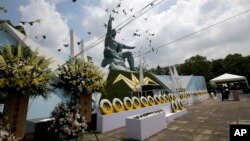The increasing threat of nuclear conflict between the United States and North Korea cast a shadow over Wednesday's observance of the 72nd anniversary of the U.S. atomic bombing of Nagasaki, Japan in the final days of World War II.
"A strong sense of anxiety is spreading across the globe that in the not too distant future these weapons could actually be used again," Nagasaki Mayor Tomihisa Taue told the crowd at the city's Peace Park. The ceremony was held a day after U.S. President Donald Trump vowed to respond to North Korea's continuing threats with "fire and fury like the world has never seen."
Mayor Taue also lashed out at Prime Minister Shinzo Abe for refusing to enter negotiations for the U.N. Nuclear Prohibition Treaty, calling his stance "incomprehensible to those of us living in the cities that suffered atomic bombings." Japan routinely abhors nuclear weapons, but has aligned its defense posture firmly under the so-called U.S. "nuclear umbrella."
Taue and the other dignitaries led the audience in a moment of silence as a bell was rung at the exact moment a U.S. warplane dropped a plutonium bomb onto the port city, killing as many as 70,000 people.
The Nagasaki bombing happened three days after 140,000 people died in the atomic bomb attack on Hiroshima, the world's first using nuclear weapons. The bombings hastened Japan's surrender to Allied forces on August 15, 1945, bringing the six-year-old global conflict to an end.






